In early 2002, I was assembling a collection of stories about “bands on the road”. Someone gave me Rick Bryant’s number, and before you could say “gumboot tea is fine,” we were on a magical mystery tour of Rick’s roving memories. His amazing experiences became eccentrically exciting when told through that unique RB lens.
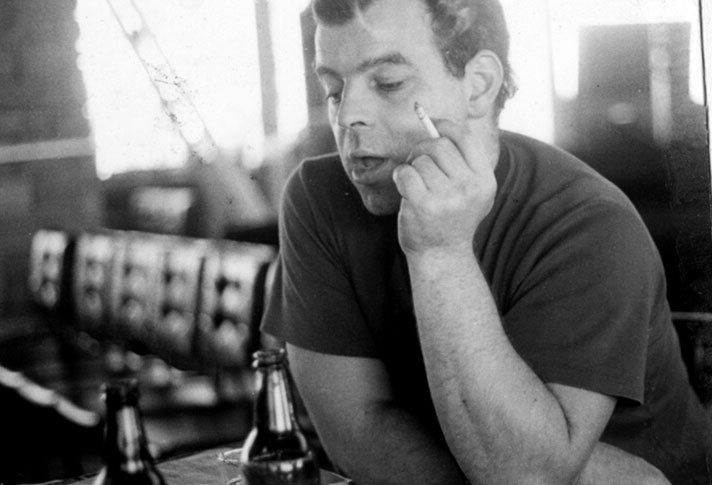
Rick Bryant - Photo by Murray Cammick
There are very few crannies on these skinny isles where Rick Bryant didn’t blast into town with band in tow and raise the roof. Of all the places he toured, he had a special affinity with the West Coast. And his senses were ignited by that roving legend, BLERTA. “January 75 with BLERTA: that was the first time I’d been to the Coast. It was something else.” The band/theatre troupe played theatres, mostly, “or something that could pass muster as a theatre. We would often do opera houses.
“One of the most memorable gigs we did [as BLERTA] on the West Coast was at the Buller County Council chambers in Westport, a beautiful old building. The day we arrived it was like North Auckland, extremely hot and sunny, the air very dry. And I just remember being in this old, dusty, hot building with the sun streaming in through the hemispheric tops along the windows, and looking out to a town that hadn’t changed much. And I just loved it.”
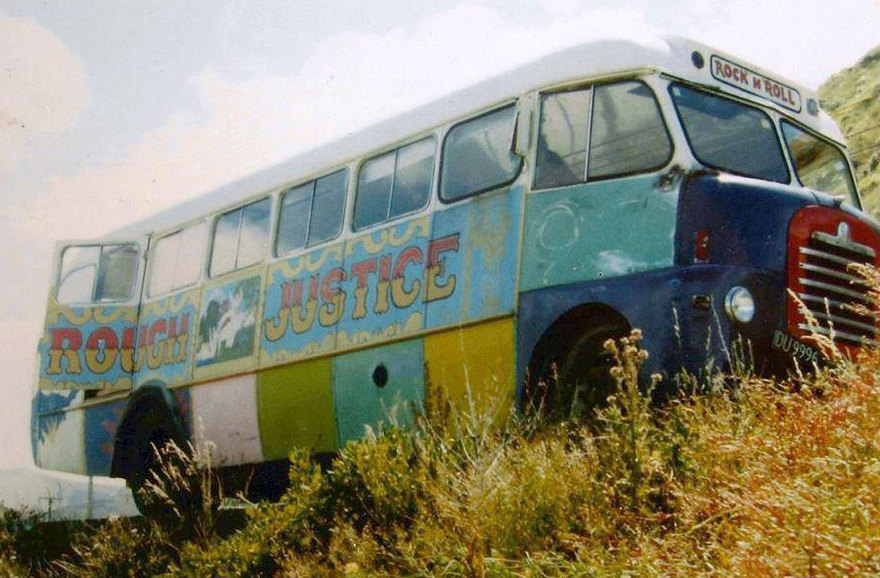
The Rough Justice bus - Nick Bollinger collection
Unsurprising, then, that when searching for a “road” anecdote his mind immediately turned to Hokitika, 1977. “I remember a lot of good-feeling gigs from the Coast. There was a night when my band Rough Justice played at a Scout hall, in Hokitika. We’d rented this hall by long distance, not knowing that the actual dance floor rolled: the piles were sunk. It was a cold and wet Tuesday night, we got set up. We were pretty tired: we’d been playing for a number of nights.
“We had about 80 people that night. We were playing dance music, but they just stood around in awe like a concert crowd! And it’s because we were playing fantastically.”
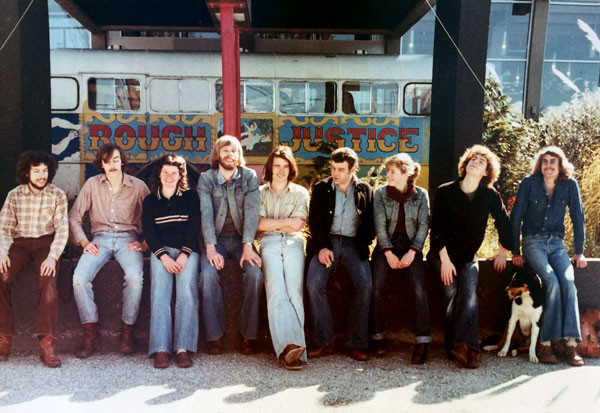
Rough Justice in Queenstown, 1978: Martin Highland, Peter Boyd, Bernadine Doyle, Peter Kennedy, Stephen Jessup, Rick Bryant, Janet Clouston, Nick Bollinger and Mike Gubb (next to his dog, Rhodes). - Mike Gubb collection. Photo by Alison Clouston.
Don’t just believe Rick about that … “About 15 years later, I was back in Hokitika at the Red Lion, playing with a little five piece, the Ya Ya’s. This guy came up to me at the end of night and he said, ‘I haven’t heard you for a few years, but I really enjoyed it. I’m glad you’re still going.’
“And I said: ‘You say you haven’t seen us for a few years? Have you ever left Hokitika? Have you lived here all the time?’
“He said, ‘Yep.’”
“And I said, ‘Do you remember that Rough Justice gig at the Kaniere Scout Hall, a Tuesday night about 1977?’”
“He said, ‘Yep, I remember it well’.”
“I said, ‘Tell me. We went away from that gig thinking we’d just had one of those gigs, those one-in-a-thousand gigs where everything seems perfect, and the music is just so satisfying because everyone is playing so well, and your teamwork is just great. Like Little Feat! Like being Little Feat for a night.’ And I said, ‘Did it strike you as being a pretty special event musically?’
“He said, ‘Yep’.
“So I hadn’t imagined it at all. He got the same buzz off at as us. And that’s my best road story!”
And that leads him, in tones of child-like wonder, to one of the other reasons the region is so special to him: the geology.
“After that [Rough Justice] night we drove off in some sort of broken-up convoy to catch the ferry at Picton. Mike Gubb and Tony Backhouse stopped in at the Berlin’s Pub [now Berlins Café & Bar, on the Lower Buller Gorge Road]. Well that’s a pub that rolls up and down! It’s about 120 years old, built at different times, and the piles are sunk.”
“They’d had the 1976 Inangahua earthquake [actually, 1968] where the whole bloody earth was rolling: railway lines. Mountains. I was there after the earthquake. The mountains had fallen over. You could see a chunk of bare rock, five miles long, along the river. It had fallen off and because it was bare, naked rock, nothing had been able to grow there. It’s only just getting covered up now 30 years later.
“I once knew the geological name for what Murchison stands under: I don’t know what it is now. But the current Windy City [Strugglers] drummer, Steve Cournane, is a geologist. So when we go around the country, and I can’t remember the name of this formation or that kind of geomorphology, he’s a handy man to have.”
At the thought of that other kind of “rock”, Rick lights up. “Because it’s wonderful geology down there, if you’re a rock-hound, if you’re into gems and igneous rocks. When I was a kid, I used to go to the Dominion Museum [Wellington] and look at the rocks and crystals and semi-precious stones. And the prettiest ones, the most interesting ones were concentrated around that area in the South Island. Hochstetter, a German geologist who did the first geological survey of New Zealand, has a lake named after him there. And around that lake is the richest area for rockhounds in New Zealand. It’s beautiful. It’s a treat deferred.”
The way he describes it makes you want to re-experience that amazing otherness of that part of world.
“The West Coast is still a bit like another country. There’s a number of things about it I really love. Sometimes you’re staying in a really crappy hotel in Greymouth. You look out the window – if you’ve got one, and you often have – and 400 metres from the middle of a town of 12,000 people, there’s the bloody bush regenerating. That’s not a park in the middle of town: it’s the bloody bush regenerating!”
From a random observation upon which he did not expand: “I’ve been in some strange situations in the Coast, and I’ve seen the most patient policemen in the world in Hokitika …” Rick pauses, goes up a gear, moving from a pet love (the West Coast) to a pet peeve. Good songwriters. Or better expressed, good songwriters who lack the recognition they should. According to Rick, anyway. And who could argue?
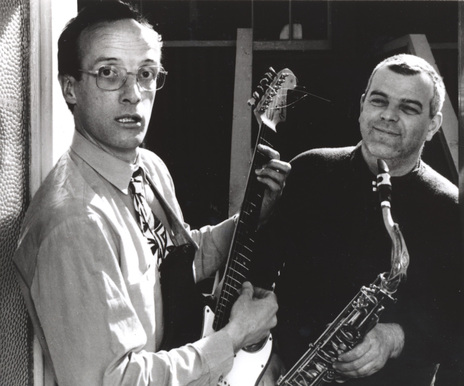
Bill Lake and Rick Bryant - Murray Cammick Collection
“I was in Hokitika with Bill Lake for an early Wild Food Festival. It was in a big marquee, there were a lot of people there, and I was guesting, doing half a dozen songs with Bill’s band, which was The Living Daylights. It was an extra good band with virtually no media and/or historical profile. Good people in it, good musicians.
“But as far as history goes nobody notices Bill. He’s a really good songwriter. I don’t think his superior merits as a songwriter have really registered. I think he’s up there with the Finns, and Dave Dobbyn and Don McGlashan. I’m absolutely serious. And what makes it with him is not only has he got tunes, but he’s got a different collection of feels that are much more interesting than your average range of pop feels. Plus, he’s got really good quality lyrics.”
“The number of songwriters in New Zealand who can write a decent lyric could be counted on the fingers of both hands with some amputation. Bill has got more width, more decent content than any of them. He doesn’t write pop songs like the others I’ve mentioned. And he often writes with Arthur Baysting too, who [co-wrote] ‘Tears’.”
Then he’s off the vinyl and back where the rubber meets the road, making it clear that while he loves those smalltown gigs, good gigs are location-agnostic. He’s played such a wide variety of music to such a vast array of audiences, in so many contexts, that even if there were a magic formula for a good gig, the arena is too disparate to apply it to.
“There’s no rules at all. Sometimes you have this feeling just before you go on stage, we can really win tonight, this is the right crowd.”
Anecdote arrives. “The Strugglers don’t normally handle a big boozy crowd very well. The band would like us to be an intimate, sober sort of folk-club band. And we were at the Big Blues Bash, at a club called the Bourbon something-or-other, and they’d pulled a black jersey crowd, quite a few hundred of them. They’d been drinking for quite a few hours.
“And I just knew that if we went on and hit it in a certain way and harnessed the energy, we were just going to kill it. And we did. And it was just really fortunate that I insisted on doing a certain song first because that made all the difference. Your first song has to be exactly [right]. If you’re going to have one of those magic shows, and really, totally get the audience by the scruff of the neck for the whole time you’re on stage, you have to have an immediate impact.”
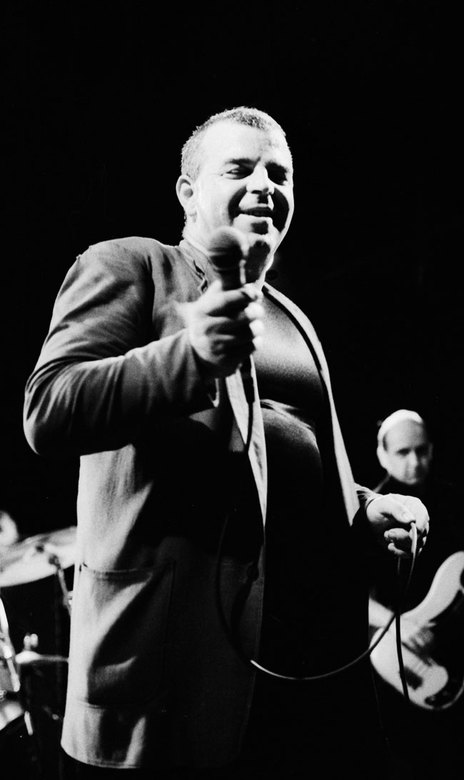
Rick Bryant at The Gluepot, 1985 - Photo by Jonathan Ganley
And as a man who takes stagecraft seriously, Rick reflects and monitors each performance. Although you sense he’s trying to measure the unmeasurable: how do you calibrate magic?
“At the end of every gig I come home and give myself a mark out of five in the diary. It’s usually three and a half, or three and three quarters. But a couple of times a year it’s a four or four and a half. And I’ve never been able to work out quite on what basis I award the mark.
“Sometimes it’s because I give a very high-quality performance, but other times it’s because it’s a very high-quality audience response. But I feel sometimes if the audience likes it too much, if the audience praises you well above your merits on the night, you actually have a bad feeling. Like your cheque’s going to bounce the next day!” He gives a deep, wry laugh.
While the audience feeds off the energy of the performers, and vice-versa, the X factor, Rick reckons, is the degree of imbibing involved. “Alcohol’s got a lot to do with that [energy]. But rock and roll’s drinking music, so it’s a given. A sober rock and roll gig that really fires … well, it can happen. Wonderful when it does.”
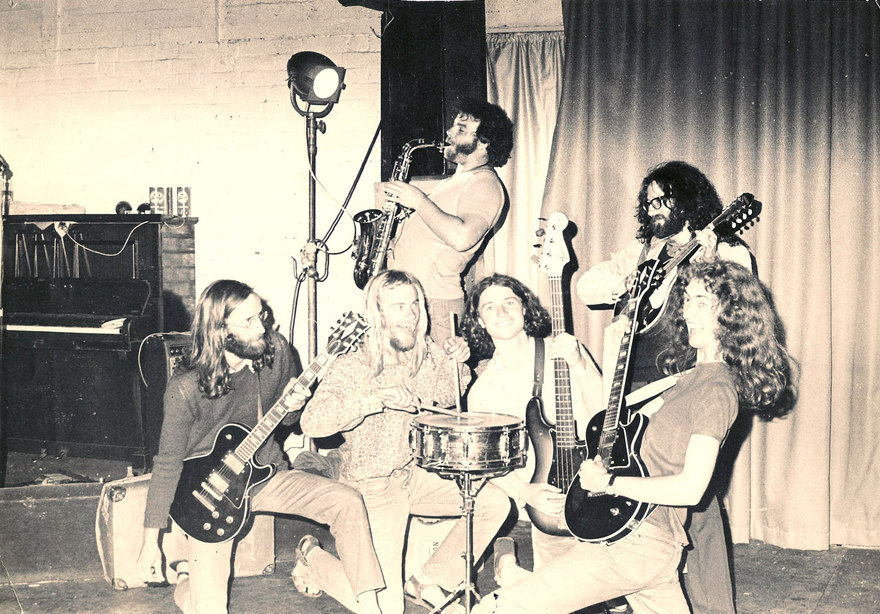
Mammal, 1972. Left to right: Bill Lake, Mike Fullerton, Rick Bryant, Patrick Bleakley, Tony Backhouse, Robert Taylor - Rick Bryant Collection
And we’re off again! To Victoria University, Wellington. “I can remember when we used to do lunchtime concerts at university: usually they were cold and stiff and didn’t happen. But there was a really unusual one, a Mammal gig upstairs in the Vic Common Room, it would’ve been about ’72, in the early days of the band.
“And although there was often liquor, or the opportunity of liquor, and there were plenty of drugs, at the night concerts, and people were excited, the lunchtime gigs were pretty cold. But this one we started halfway through the afternoon, and so there was no alcohol and even the band, because we used to drink a lot, was remarkably sober.
“It started off at moderate pace, but after we’d been playing about half an hour, the whole joint was starting to go off. And it was a mid-winter afternoon: dark, horrible. Inside it was all warm, and about 600 people just went off as if they’d had half a bottle of scotch each. People weren’t fucking lying around in their armchairs cruising out in a blissful haze of short-term memory loss.” He guffaws. “It was great. And so, it can happen. It was just rock and roll.”
Inexplicable. But then, the world is full of inexplicable things. Not entirely?
As a widely read ex-academic, writer, songwriter, film reviewer, performer, Rick Bryant had formed a core philosophy along the way. Unsurprising for a musician, it was a love of maths. Especially tricky mathematics. He loved algebra.
“It’s a language. It explains everything. You cannot describe music in scientific terms without immediately going into a whole lot of maths. And the natural world is full of things that numbers explain. And you only have to use your eyes and ears.”
Maths-geek or not, he couldn’t resist the allure of the rock and roll circus, being one of its greatest performers. Even though he knew the chances of massive success were almost non-existent, especially way down here.
“Bill Lake and I knew when we were 20 how the real world operated.”
Pause.
“But why should we aspire to join the real world? I mean, you could call that fatalism or defeatism.”
“Or realism?” I cautiously suggest.
And Rick Bryant lets go that almighty guffawing cackle, embracing and unsettling in its suddenness.
“Yeah! But time and time again I’ve told myself that this is the week I’m going to learn to be a realist.”
He pauses for a second.
“Because it’s about bloody time!” And off he goes again, cackling into the thick smoke of his apartment where our tea lies cold in its cups. But the room is warmed and electrified by the recollected rock and roll rants of this remarkable raconteur.
--
This previously unpublished interview was intended for Michael Larsen’s book about New Zealand bands on the road, See Me Go (Penguin NZ, 2003). Among the musicians featured were Jordan Luck, Fiona McDonald, Dave Dobbyn, Stellar*, Greg Johnson, the feelers, and the Screaming Meemees.